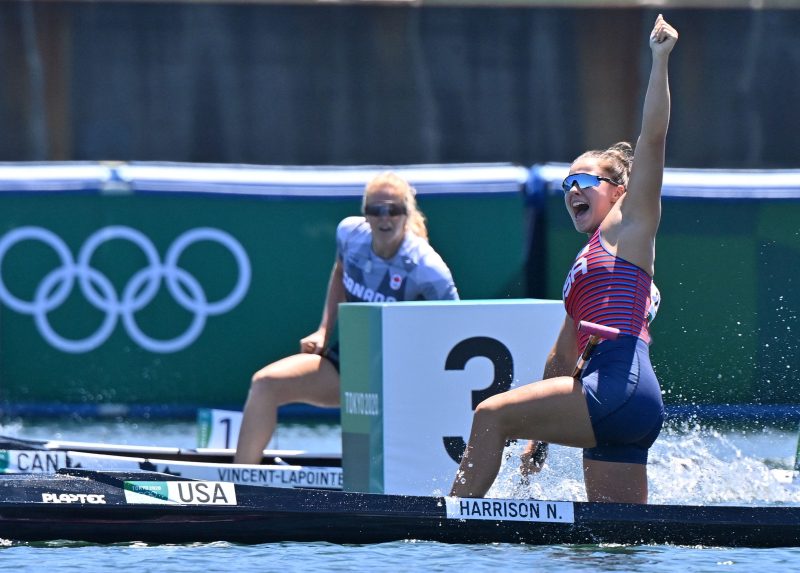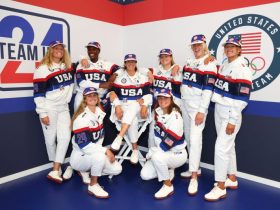Nevin Harrison, like so many other Olympic athletes, spent years of her life working to win a gold medal and dreaming of the perks that would follow. She thought being a gold medalist would give her a certain degree of celebrity. A steady stream of high-dollar sponsorship deals. A sense of balance and fulfillment in her life and work.
Instead, after winning gold in the women’s canoe 200-meter sprint at the 2021 Tokyo Games, Harrison only found snippets of all of those things. And after grappling with what she called ‘a coaching nightmare,’ she even considered punting on the 2024 Paris Olympics altogether.
‘I had this battle of, do I really want to keep going? Is it worth it?’ Harrison told a small group of reporters at a media roundtable in New York earlier this year. ‘Because it’s clearly not for the money. And do I love it enough to stay for another however many years?’
Harrison, who was just 19 when she won gold in Tokyo, ultimately decided to stick it out and will try to repeat in the women’s 200-meter canoe sprint in Paris from Aug. 8-10.
Now 22, she credited her new coach, Joe Harper, for coming into the picture ‘just in time, before I almost gave up.’ And she said she’s worked hard to strike a balance between Harrison the gold-medal-winning paddler and Harrison the college student who enjoys living a normal life.
2024 Olympic medals: Who is leading the medal count? Follow along as we track the medals for every sport.
‘Besides the tattoos and the muscles, you would never have any idea that I actually have gone to the Olympics and brought home a medal,’ Harrison said. ‘But I like it that way. I like to not have that be my entire personality.’
Harrison, who finished fourth at the most recent world championships, said winning gold in Tokyo definitely changed her life, but not in the ways that she expected.
After the initial wave of post-Games hooplah ended, she moved to San Diego, enrolled at San Diego State University and came to relish normal life. The big-money sponsorship and endorsement deals that she had envisioned didn’t materialize, nor did her preconceived idea of fame. But she was OK with that. Although she said she is recognizable in some European cities where canoeing is more popular, she’s been grateful to maintain her anonymity in the U.S.
The lack of a financial windfall following the Olympics, coupled with her life as a college student, made her start to question whether she had the drive to continue competing.
‘I fell in love with external life. It made it really hard to stay in love with what I was doing,’ the Seattle native said. ‘Slowly but surely, I worked my way back in and tried to find out ways to balance the two.’
Coaching challenges also played a role in Harrison’s thought process. She indicated that her longtime coach, former Hungarian paddler Zsolt Szadovszki, planned to move to San Diego to continue coaching her then reversed course and asked to coach her remotely − ‘which is something that most athletes know isn’t going to work,’ she said.
When asked to elaborate on her self-described ‘coaching nightmare,’ she said only that there were several pieces of the arrangement ‘that just kind of fell apart.’
‘I think ultimately, there’s so much that goes into coach-athlete relationships that people don’t understand,’ Harrison explained. ‘I think once that trust is broken or if there’s something that goes wrong, it’s really hard to repair that.’
Szadovszki, for his part, said he had made personal and financial sacrifices to continue coaching Harrison, including leaving jobs in Georgia and his native Hungary. But he felt her motivation and commitment to their agreed-upon training plan had waned, prompting him to leave California weeks after arriving.
‘For me, it’s not trust,’ Szadovszki said. ‘For me, it’s just not doing the work that’s required.’
After they ended their relationship, Harrison turned to Harper. Though she’s known the veteran paddling coach since she was 12 or 13, Harrison admitted it’s a bit nervewracking to entrust her training to a new coach after winning Olympic gold with someone else. In fact, she is the only Olympic gold medalist in the history of her event, which debuted in Tokyo.
After struggling with an unspecified back injury for much of 2023, Harrison said her fourth-place finish at the world championships in Duisburg, Germany, last fall was motivating.
With a new coach and a renewed passion for the sport, she said she has something to prove in Paris.
‘People think I lost it,’ Harrison said. ‘So it’s time to show them.’
Contact Tom Schad at tschad@usatoday.com or on social media @Tom_Schad.






